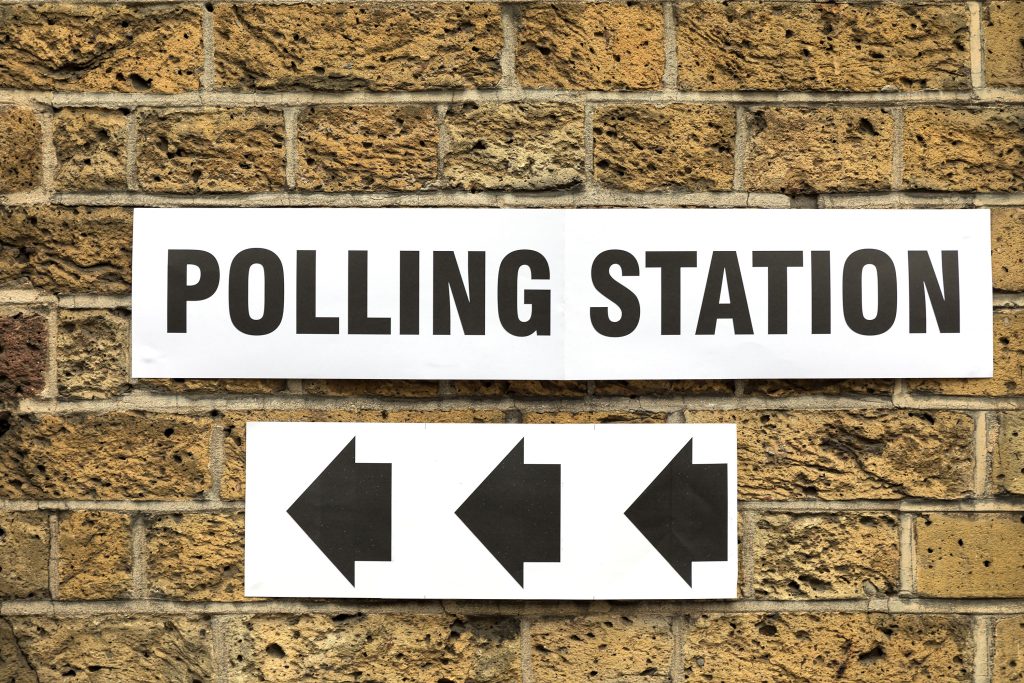Global Public Affairs Newswire – 3 May 2024
Welcome to the latest instalment of the FTI Consulting Global Public Affairs Newswire. In this edition, we look at the US and EU election campaigns as they start to heat up, as well as the UK local elections which took place yesterday. Additionally, our comprehensive market update examines key developments across a range of regions around the world. This week, our team in Dublin has taken a in-depth look at the importance of engaging political stakeholders ahead of elections, and our EU team are back with the latest episode of The Electoral Pulse, speaking to our expert in Paris- Gregory Grellet, Head of Government Relations, Public and Regulatory Affairs for FTI Consulting France.

Our team is closely following the ‘Year of the Election’ and taking a deep dive into the upcoming implications, considerations, and opportunities for the business world.

New national polling indicates former President Donald Trump holds an advantage over President Joe Biden amongst registered voters, with Trump holding 49% versus Biden’s 43%. 55% of all Americans also now see Trump’s presidency as a success, versus 39% for Biden’s time in office so far. This comes as a separate poll found Biden to be ahead in just one of the seven “battleground” states most likely to determine the outcome of his rematch with Trump, leading Michigan by two percentage points. The significance of support for independent candidates is also important, with one poll finding the third party vote – in particular, votes for candidate Robert F. Kennedy Jr. – cuts deeper into Trump’s vote than Biden’s.
TIME Magazine released an exclusive interview with Trump this week, in which he set out the details of his agenda for a second term, should he be successful at the polls in November. His key policies involve reducing the size of the U.S. civil service, taking a tougher stance on immigration, and intervening more directly in Justice Department prosecutions than his predecessors. Notably, the former President was quizzed on his stance on abortion, an issue he said should be left to individual states to decide on. This will be a key topic as the elections approach, particularly as the controversial Florida ban on abortions after 6 weeks of pregnancy came into effect this week.
This comes as protests across U.S. universities regarding the conflict in Israel and Gaza continue to feature prominently in the U.S. news cycle. Criticism of Biden’s handling of the conflict from university students has prompted speculation that the President may suffer reduced support for his campaign from young people in particular. It’s likely the conflict will continue to be a key issue in shaping voter views on the presidential candidates moving forward.

With less than 40 days to go ahead of the European Elections (6-9 June), the campaign is getting into full swing – both in Brussels and the 27 Member States. With only 35% of Parliamentarians re-running based on the current lists published, these elections will lead to a European Parliament with a large number of new stakeholders. Beyond the Members of Parliament, these elections also re-set all the top jobs across the key European institutions, with the focus being on who will be the next Commission President. While current President of the European Commission von der Leyen is the main contender for the post, recent political developments will make her path to reappointment more difficult than was initially expected (see her campaign website here). She is facing increased scrutiny due to her appointment of a European Commission special envoy for SMEs (Markus Pieper stepped down before he even began his post), as well as ongoing questions about how some of the COVID-19 contracts were negotiated during the pandemic. To obtain a second mandate, von der Leyen will need to be confirmed by the European Parliament and by the heads of State.
The Parliament’s backing, which was already slim in 2019, is even less guaranteed following the June elections. Some Slovene and French Members of the European Parliament from her own political family (the centre-right European People’s Party, EPP) stated that they would not support her candidacy. Beyond her own political group, a key question will be who the current President can partner with in the European Parliament to secure a majority. Currently, the President’s Group, the EPP, has the support of the centre-left Socialists and Democrats (S&D) and the liberal Renew Europe Groups. Based on our FTI projections, this political alliance barely holds its majority, meaning that the EPP may need to look for new allies further on its right, such as the European Conservatives and Reformists (she has excluded a coalition with the far-right Identity and Democracy). Beyond the Parliament, she will also need to obtain support from all heads of state. For this, continued support from President Macron will be essential.
If you have any questions about how you could best prepare for these political changes, please reach out to: [email protected].

Millions of people in England went to the polls to yesterday cast their votes in elections for local councils, mayors, and police and crime commissioners. A by-election also took place in Blackpool South, a marginal seat the Conservatives had gained from Labour at the 2019 General Election. The by-election had been triggered by the resignation of the incumbent MP, Scott Benton, following a scandal in which he was filmed by undercover journalists posing as gambling industry investors. On the recording, Benton offered to lobby government ministers in return for cash payments.
At the time of writing, 36 of 107 councils up for election have declared their results, with these early results proving strong for Labour (up 53 seats) and disappointing for the Conservatives (down 123 seats). The Conservatives have lost roughly half the seats they were defending so far, but it should also be noted that these seats were last up for election in 2021, a high watermark for the Conservatives. At the 2021 local elections, Boris Johnson was still the Prime Minister, had just secured a highly successful COVID-19 vaccine rollout, and the “Partygate” scandal was yet to emerge. Today, two Prime Ministers later, the picture looks very different for voters deciding to reward, or indeed punish, the Conservatives.
It can be safely assumed that Labour have comfortably won the mayoral elections in Manchester and the Liverpool city regions, traditional strongholds for their party. Labour are also favourites to win in the East Midlands, North East, and York and North Yorkshire regions, which are electing mayors for the first time. Indications from both Conservative and Labour sources are that the mayoral elections in the West Midlands and Teesside, where the Conservatives are defending both mayoralties, remain too close to call. Should the Conservatives hold both the West Midlands and Teesside, a sigh of relief will be felt in 10 Downing Street- rumours had spread in Westminster that should both be lost, a leadership challenge to Prime Minister Rishi Sunak would be on the cards.
Perhaps most interestingly, the Conservatives are bullish about their chances in the London mayoral election, with some anonymous party sources going so far as to claim that differential turnout between central and outer London could see them score an unlikely victory. This remains unlikely- the Conservatives have not won the London mayoralty since 2012 when now-former Prime Minister Boris Johnson was elected for his second term at City Hall. But the result may well be much closer than many commentators, or the political parties, themselves expected.
Market updates

President Xi stressed that the two countries should be partners rather than rivals, that each should help each other succeed rather than hurt each other, that both countries should seek common ground and reserve differences rather than engage in vicious competition, and that both should honor words with actions instead of saying one thing but do another.
On a working level, Foreign Minister Wang reiterated that the fundamental question to be answered remains that should the two be partners or rivals. He highlighted China’s longstanding positions on Taiwan, on the US tech and trade restrictions against China, and on the worrying trend of the projection of the US-China competition in the Asia Pacific, referring to the US’s coercive measures forcing regional countries to choose between the US and China and the US’s deployment of land-based mid-range ballistic missiles in the region.
Conversely, Secretary Blinken raised concerns about China’s “non-market economic policies and overcapacities,” “human rights violations,” and China’s role in the Russia-Ukraine conflict. He underscored the importance of preventing advanced US technologies from being used to undermine US national security, reiterated the US’s one-China policy on the issue of Taiwan, and stressed the importance of the rule of law and freedom of navigation in the South China Sea. Both sides appraised the joint counternarcotics cooperation, the enhanced military-to-military communication, and forthcoming talks on managing AI risks. Both sides also discussed the crisis in the Middle East and the issue of the Korean Peninsula.

On 29 April, in a significant development within Scottish and UK politics, Humza Yousaf, Scotland’s First Minister, announced his intention to resign as leader of the Scottish National Party (SNP). His tenure will continue until the SNP selects his successor.
His resignation follows a tumultuous week in which Yousaf ended the power-sharing Bute House Agreement with the Scottish Greens, jeopardizing the SNP’s majority in the Scottish Parliament. This abrupt end to the coalition was primarily down to irreconcilable differences over environmental targets and other policy issues, leading to a rapidly escalating political crisis marked by proposed votes of no confidence from both the Scottish Conservatives and Scottish Labour.
Yousaf’s exit triggers another SNP leadership contest, the second in two years. His own rise to power followed the unexpected resignation of Nicola Sturgeon, who stepped aside amidst a police investigation into the party’s finances that continues to cast a long shadow.
Among the frontrunners for leadership, John Swinney has emerged as a prominent candidate, while Neil Gray and Jenny Gilruth – being close to the current administration – offer continuity and renewal. Kate Forbes, who came a close second in the last SNP leadership contest and has a more conservative stance on social issues, is also expected to be a strong contender, although her views may challenge alliances with parties like the Greens.
With faltering unity among the pro-independence factions and its poll numbers sagging, the path ahead for any new SNP leader seems fraught, and the party faces a formidable challenge in restoring its previously dominant standing before this year’s UK General Election. As things stand, the SNP is likely to suffer significant losses in Westminster seats at the turn of the year, with potential repercussions echoing into the Scottish Parliamentary elections in May 2025.

On 29 April, and 40 days ahead of the European elections, the lead candidates from various political groups participated in the ‘Maastricht Debate,’ to foster a connection between European citizens and democracy.
Each political group’s lead candidate, known as the ‘Spitzenkandidat,’ was invited to participate. This process, where the Spitzenkandidat of the group with the most votes becomes the President of the European Commission, is being trialled for the third time. Overall, the debate provided insights into the candidates’ stances and priorities, offering voters a glimpse into the upcoming European Elections.
During the debate, candidates from various parties discussed key issues such as climate change, foreign policy, and European democracy. Notably, Ursula von der Leyen’s performance received positive feedback as she defended initiatives including the Green Deal and addressed concerns about EU support for Ukraine. However, her stance on potential cooperation with the right-leaning European Conservatives and Reformists Party raised questions.
The debate also featured discussions on climate change, with emphasis on completing the Green Deal and addressing farmers’ concerns. Additionally, foreign policy topics, including defence and ongoing conflicts, were debated, highlighting differing perspectives among the candidates.
In terms of European democracy, issues such as foreign influence and digital platforms were discussed, reflecting the candidates’ priorities and proposed solutions.

U.S. lawmakers stayed in Washington last week to finish the months-long effort to send funding to Israel, Ukraine, and Indo-Pacific allies. Following the House of Representatives passage of the $95.3 billion national security supplemental, the Senate voted to pass the package, which was then swiftly signed into law by President Biden.
In addition to providing funding for key U.S. allies, the legislation also includes policy provisions that would ban TikTok should its Chinese parent company fail to sell its stake in the company. With foreign funding cleared from Congress’ to-do list, the Senate has turned to reauthorizing the Federal Aviation Administration (FAA), which is operating under a short-term extension that expires on May 10. The House passed its version of the FAA reauthorization bill in July 2023, but disagreements over several provisions derailed attempts in the Senate to pass the bill late last year.
The House and Senate reached an agreement on final bill text over the weekend, providing the Senate less than two weeks to pass the bill before the current short-term authorization expires. The “must-pass” legislation would reauthorize the FAA through 2028 and is one of the few remaining bills that Congress is likely to pass before it adjourns at the end of the year. While House Speaker Mike Johnson has so far staved off efforts of his most conservative Republican colleagues to remove him from the Speakership, the possibility of his ouster looms like a dark cloud over the House Republican Conference as he navigates a historically thin majority. If you have any questions, please reach out to our U.S. Government Affairs team at [email protected].

Long before the general elections started in India, PM Modi signalled unwavering confidence in his returning to power for a third time by asking all ministries to chalk out a detailed first-100-day program for new government. Inputs have reportedly been received from most ministries and are being consolidated into an ambitious 100-day master-plan, to kick off immediately after results are declared on June 4.
The ministry proposals expand on the goals outlined in the ruling party’s election manifesto, encompassing economic revival, infrastructure development, social welfare, national security and other areas, according to media reports quoting government sources. No document related to this 100-day plan has, however, been released yet by the government.
The plans include announcement of a project to establish 10 new urban centers to alleviate population congestion and expand the manufacturing and services sectors. The new cities project is estimated to require an initial investment of USD 1.2 billion over several years. There is also a related proposal to subsidize interest on home loans, to accelerate the urban centers’ development.
On data security, the government plans to notify the missing rules for the Digital Personal Data Protection Act 2023 and introduce amendments to the IT rules to address issues like misinformation and AI-powered deepfakes. A Cyber Fraud Mitigation Center is expected to be announced to combat financial frauds, including online scams.
Similarly, crucial reforms in the creation of a national financial information registry, and key amendments to the insurance and insolvency laws, especially to reduce bankruptcy delays, will also likely be pushed through post elections.
As per media reports, a panel of government officials have also presented a 2047 forecast to PM Modi that projects the Indian economy crossing USD 30 trillion (from under USD 4 trillion today) , with per capita income at USD 18,000, up from USD 2,610 today.
Greater clarity on the 100-day priorities will emerge only after the 2024-25 Budget presentation in July, following the announcement of the new government.

From 22 to 26 April, the Hannover Messe took place in Lower Saxony’s capital. The fair is known as the world’s foremost showcase for mechanical engineering and electronics, boasting over 4.000 exhibitors. This year’s theme “Energizing a Sustainable Industry” covered eco-conscious production, artificial intelligence, and energy transition solutions. Chancellor Olaf Scholz (Social Democrats) and Norwegian Prime Minister Jonas Gahr jointly inaugurated the event, with Norway being the partner nation.
In February, Germany’s economic growth forecast stood at a modest 0.2 percent, a stark contrast to the anticipated global growth rate of approximately 3 percent. Consequently, all eyes at this year’s Hannover Messe were on the nuanced messages conveyed by German policymakers to the mechanical and digital industries. A notable exchange unfolded between Chancellor Olaf Scholz and Siegfried Russwurm, President of the Federation of German Industries (BDI). Scholz implored industry leaders to fortify Germany’s economic stature rather than critique it, responding to previous criticism by Russwurm about the Chancellor’s communication as well as warnings about the state of German industries. The atmosphere intensified the next day during a press conference led by the BDI President, possibly due to a prior agreement of non-confrontation between the Chancellor and Russwurm, which the Chancellor breached with his critical remarks.
Minister for Economic Affairs and Climate Protection Robert Habeck (Greens) also made a notable appearance, unveiling a green steel labeling system alongside steel industry representatives. The initiative aims to delineate the share of products produced using eco-friendly methods, aiming for transparent international expectations and market standards for green steel.

Minister of Finance Fernando Haddad submitted to the Congress a long-awaited proposal containing details on a tax reform approved last year. A key element of Lula’s growth strategy, the government claims it could impact GDP by 10-20%. With around 300 pages and 500 articles, the document is the first in a series of three texts that should be sent to Congress by the end of this semester to streamline the current tax framework, which is considered extremely complex.
The presidents of the Chamber of Deputies and the Senate have said that they should speed up the analysis of the texts so that they can be approved this year. However, experts warn that the timing of the municipal elections and the succession in Congress could affect the timeline.
Meanwhile, despite a growing debate about the government’s fiscal responsibility and deficits in public accounts, the Lula government has already released around R$14 billion in parliamentary amendments between January and April 2024. The amount is three times that released by his predecessor, Jair Bolsonaro, in the same period of 2020, when the last municipal elections took place. Classified as an instrument of political articulation and bargaining for the approval of the government’s priority agendas, parliamentary amendments are the main mechanism through which lawmakers allocate resources to their constituencies. This explains the pressure from congressmen for more amendments to be released until the population goes to the polls to elect local officials in October.

In an unexpected yet strategic political maneuver, Spanish Prime Minister Pedro Sánchez has announced his decision to continue in office, following a contemplative five-day hiatus that began on April 24th. This pause in his duties was prompted by legal proceedings initiated against his wife, which Sánchez attributed to political attacks from right-wing factions and conservative media, aimed at fostering national division. During this period, Sánchez maintained different strategic discussions, including a pivotal meeting with the King of Spain.
The implications of his potential resignation were significant, potentially leaving Spain under a caretaker government during a critical electoral period. This comes at a time when the PSOE is navigating waning public support and a noticeable demobilization of the left-wing electorate, as evidenced by recent regional electoral setbacks in Galicia and the Basque Country.
The forthcoming regional elections in Catalonia on May 12th and the European elections on June 6th represent critical junctures for Sánchez’s administration. While the PSOE is anticipated to lead in Catalonia, it will probably not reach the necessary parliamentary representation to obtain an absolute majority in the regional chamber. Regarding EU elections, it trails behind the Popular Party in pre-electoral polls.
The political landscape is expected to be further complicated by increased polarization and strategic recalibrations within the PSOE. Sánchez’s decision to stand firm could potentially realign and mobilize the socialist electorate, impacting upcoming electoral outcomes, and particularly against Catalan independentist parties.
Looking ahead, the possibility of Sánchez transitioning to a significant role within the European Council highlights a strategic pivot that could leverage his favorable standing in Brussels, contrasting with his contentious position at home.
This episode underscores the resilience, dynamic and often unpredictable nature of Sánchez’s political leadership. As Spain heads into a packed electoral season, the decisions made in these moments are likely to resonate far beyond national borders, influencing the broader European political narrative.

On April 21, various sectors in the main cities of the country protested against the Government and its social reforms in Congress. Although the healthcare reform was recently killed in Congress, the Government plans to reintroduce it to progress alongside pension and labor reforms, which are still in legislative process.
While the streets were previously a space for political discourse primarily used by left-wing social movements, Petro’s opposition has sought to express themselves through channels that the President believed were exclusive to his movement taking the Plaza de Bolivar in Bogota.
For Petro, mobilizing their supporters is a legitimate expression of the primary constituent. However, opposition marches are seen as a “soft coup” to undermine the popular mandate. Therefore, in response to this mobilization, he invited labor unions, “legitimate” counterparts in his cause, to allow him to march alongside them on May 1 to defend the importance of his proposals, in the midst of ongoing investigations for alleged lack of transparency in his campaign funding that includes very relevant unions such as the USO and FECODE.
Disputes on the streets reflect the complicated governance landscape that Petro faces and the need for dialogues that, beyond the scale of mobilizations, lead to concrete agreements in Congress. Without these, the Government will be forced to govern through decrees, subject to constant political scrutiny for the remaining time in office and judicial review.
This approach showcases what some consider the final radicalization of the government but also, it means closing the door on addressing legitimate issues the country continues to face.

French President Emmanuel Macron gave a speech on his vision for the future of Europe at Sorbonne University on April 25, marking his entry into the European election campaign at a time when his candidate Valérie Hayer’s list is struggling in the polls. The French President, who had given a speech on the same theme in September 2017 also at Sorbonne University, had indeed promised to lend a hand to the candidate at certain moments in the campaign.
In a speech that frequently returned to the theme of a fast-changing global order, President Macron evoked the death of Europe as a real possibility. He stated that “In the next decade, the risk is immense that we will be weakened, even relegated”. He emphasized that Europe faces possible demise if it does not take bold action to tackle U.S. and Chinese protectionism, amid serious geopolitical threats from authoritarian regimes. He also made a series of new proposals in the areas of defense, economy, and trade to “put Europe back on the right track.” He said that the EU should aim to become a “world leader” by 2030, with “dedicated financing strategies” in five areas: artificial intelligence, quantum information, space, biotechnologies, and new energies.
He also called for “a growth objective, or even an objective of decarbonisation” to be added to the missions of the European Central Bank. Despite insistence from the Presidential Palace that it was not a campaign speech, it was hard to not put Macron’s intervention in the context of EU elections. President Macron did not mention the campaign directly but took aim at “nationalists that no longer argue in favor of leaving the EU but simply of disrupting it from the inside”, therefore aiming directly at the far-right political opposition, who leads the European elections polls with 31% of voting intentions, while the presidential party (Renaissance) only gathers 17% of voting intentions.
Commentary around the speech also underlined that despite being criticised as overly ambitious in his 2017 speech, Macron was right on several counts, especially on EU strategic autonomy, which is now official EU policy. It remains to be seen whether his proposals will be adopted or treated with caution, as they were previously.
Expert Analysis |
Upcoming UK event: What do the local election results tell us about the General Election?
Come and join us for an engaging conversation about the ramifications of the forthcoming local elections in England and Wales. Led by Alex Deane, UK Head of Public Affairs & Conservative Parliamentary Candidate, our in-house expert political panel will will explore these important topics in depth.
When: Wednesday 8th May at 4:30pm, followed by refreshments
Where: FTI Consulting London
Ireland’s Year of Elections: Why now is a critical time to engage your political stakeholders
As the upcoming General Election draws near in Ireland, our Dublin-based FTI Consulting team are highlighting the importance of engaging political stakeholders now, and offers insights into how companies can ready themselves for potential policy and regulatory shifts that might affect their organizations.
EU Podcast – France
The Electoral Pulse is back with a new episode—this time, diving into the French elections with our expert in Paris Gregory Grellet, Head of Government Relations, Public and Regulatory Affairs – France. Join our hosts, Anne-Sophie Deman and Jeremy Van Gorp as they explore the trends and how time has changed the political landscape in France.
Inside(r) Berlin Event
The upcoming European Parliament elections come at a time marked by significant geopolitical tensions and uncertainties.
On April 19, the Public & Government Affairs team in Germany had the priviledge of engaging in a conversation about the complex geopolitical environment and the influence of the EU elections on foreign and trade policy. This discussion featured David McAllister MEP, who serves as the Chairman of the European Parliament’s Committee on Foreign Affairs and is the lead candidate of the CDU in Lower Saxony for the European elections.
Upcoming Conferences, Elections and Webinars
- 05 May: General Election (Panama)
- 07 May: General Election, third phase (India)
- 13 May: General Election, fourth phase (India)
- 19 May: General Election (Dominican Republic)
- 20 May: General Election, fifth phase (India)
- 25 May: General Election, sixth phase (India)
- 29 May: General Election (South Africa)
- 01 June: General Election, seventh phase (India)

To be added to the distribution list for the Global PA Newswire, or for further information on the dedicated Public Affairs team at FTI, please contact [email protected]. |
The views expressed in this article are those of the author(s) and not necessarily the views of FTI Consulting, its management, its subsidiaries, its affiliates, or its other professionals.
©2024 FTI Consulting, Inc. All rights reserved. www.fticonsulting.com







